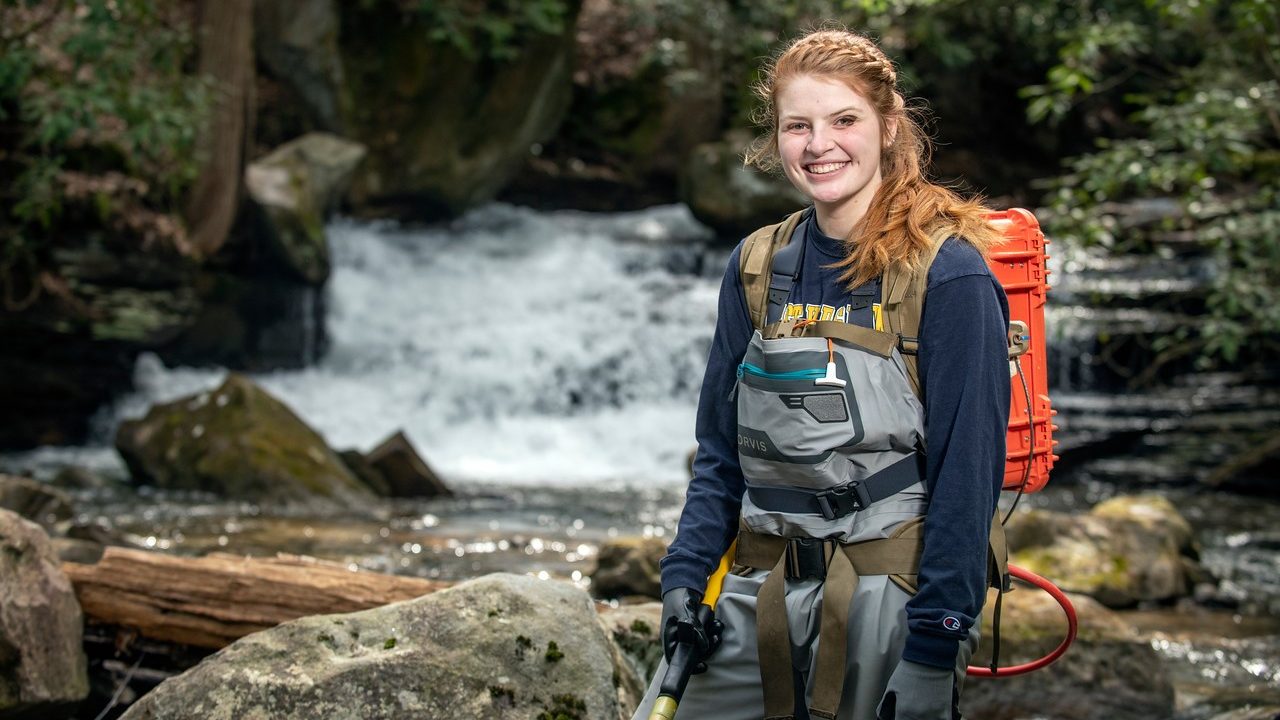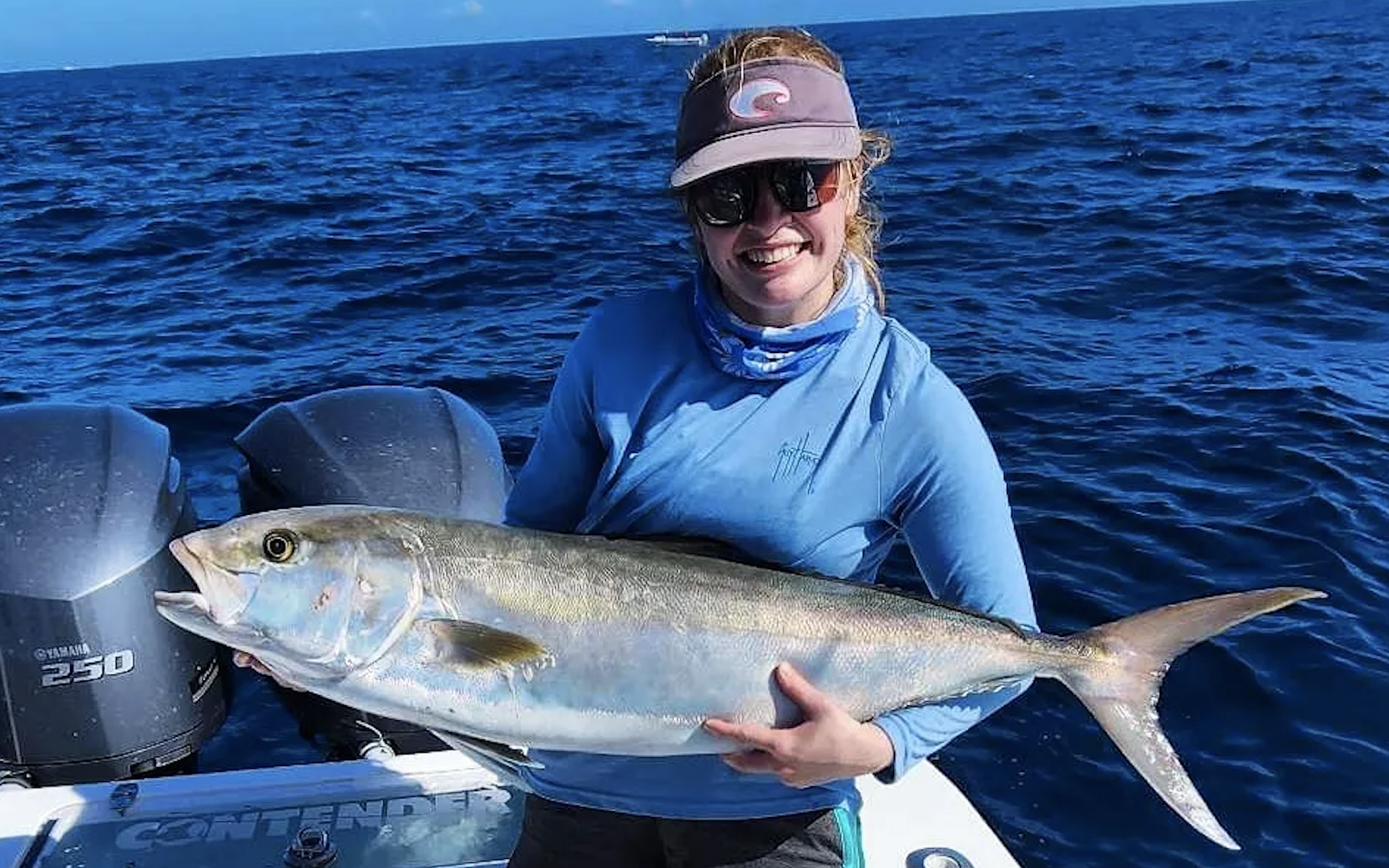Researcher Spotlight – Bethany Wager

2022 Global Change Fellow
Phd Student, Department of Applied Ecology
Advisor: Dr. Jeffrey Buckel
Every year the Southeast Climate Adaptation Science Center funds a multi-disciplinary cohort of Global Change Fellows representing colleges across NC State University. Here are some highlights about 2022-23 Fellow, Bethany Wager and the applied research she’s conducting.
About You
What do you study?
I am interested in fisheries ecology, and plan to study movement patterns and habitat use of marine fishes specifically. I want to tackle questions about why distributions of fishes vary over time and how to incorporate this into management plans. These questions can often be addressed by looking at environmental variables being influenced by climate change. By better understanding our fisheries, we can make recommendations to ensure these resources are available for both recreational and commercial anglers for years to come.
What (or who) influenced you to go into this field of study?
I grew up canoeing the rivers of West Virginia, fishing for smallmouth bass and muskie. I spent countless hours with my brother and father in the great outdoors which led to my passion for the environment. During my undergraduate years at West Virginia University (WVU), I conducted research on native Brook Trout populations in headwater streams of Appalachia. I enjoyed the scientific process and working to conserve a native fish species sought after by many recreational anglers. After my first year at WVU, I had the incredible opportunity to go on a deep-sea fishing trip off the coast of the Outer Banks of North Carolina. As we made our way into the ocean, a pod of dolphins swam along the boat and flying fish were gliding all around us. It was an amazing sight, and I was in awe of how extraordinary the ocean’s species and ecosystems were. These experiences inspired me to dedicate my career to conserving and sustainably managing marine life. I hope to understand and predict changes in coastal fisheries, share that knowledge with others, and play a part in the conservation and management of marine ecosystems and resources for future generations.
What are three words your friends would use to describe you?
My friends would probably say that I am outgoing, adventurous, and a good planner. I love being outdoors, trying new things, and am always planning my next adventure. I definitely am that friend who makes the trip leave the group chat.
About Your Research

Who will benefit from your research?
I hope that my research will benefit fisheries managers, policy makers, and anglers. Understanding current and future distributions of economically and ecologically important fish species is a key factor for making informed suggestions on future fisheries regulations.
What is the most important thing that you’ve learned?
I have taken many classes covering ecological concepts, fisheries biology, and data collection techniques. However, it was not until this past fall that I was able to take a course where I learned what to do with the data you collect. The course, “R Coding for Data Management and Analysis” helped me understand what to do with my data, how to keep it tidy and organized, and how to visualize results to share your research. R is a programming language for statistical computing and graphics, and it can be difficult to learn. I am very thankful I was able to take a formal course on this programming language and I know the skills I learned will be a great advantage as I begin my own research.
How would you describe your research to a 3rd grader?
Studying fish is like studying trees…if the trees were invisible and could move around. You cannot see fish to know where they go, when they move, or why. There are different ways to track fish since they are underwater, and we cannot see where they go. By tagging a fish, we can track them, and learn more about their movements. We want to know where, when, and why fish move so we can prepare for the future when fish may be moving more and more and in places they did not go before.
About Your Global Change Fellow Experience
How do you expect the SE CASC Global Change Fellows Program to impact you and your work?
This program has taught me so much! I have learned about working with communities and the importance of trusting partnerships. As I begin my own research, I will prioritize building relationships with the local fishing community because you can learn so much from the people that live and work in the area you are studying. Additionally, I have been able to make connections across a broad range of research disciplines. This has opened my eyes to the many types of projects that could be incorporated into my own work. Overall, I think this program has made me more aware of the multitude of people you can and should work with when conducting research.
What has been the most rewarding part or your favorite part of being a SE CASC Global Change Fellow?
The field intensive workshop in Beaufort, NC has been my favorite experience as a Global Change Fellow. We learned about many different topics and ecosystems in coastal North Carolina. I will be moving to the area as I begin my research at the Center for Marine Science and Technology (CMAST), so having this week at the beginning of my Ph.D. experience to learn about the area and people I would be working with was awesome. I also really enjoyed getting to know the other fellows and the research they conduct. There are many disciplines represented within the Global Change Fellow cohort. When talking about the challenges of climate change during the field intensive, I heard many different perspectives, and it really highlighted the importance of learning from others that come from different backgrounds.
What advice would you give to a student that is interested in getting involved in your field?
I think the best way to learn what you want to do is by trying new things and finding what you absolutely do NOT want to do. Volunteer for field work, go to conferences, and learn from the people around you. I also would highly recommend those wanting to get involved with wildlife and fisheries science join The Wildlife Society and/or The American Fisheries Society. Many universities have student chapters for these societies, and this is where I made connections, was awarded travel funds for conferences, and learned about new research ideas to incorporate in my own work. Lastly, reach out to people if you have questions about their work or how they got to where they are in their career. These conversations have been so beneficial and helped me navigate through my undergraduate years to land my dream graduate school position.
- Categories:
